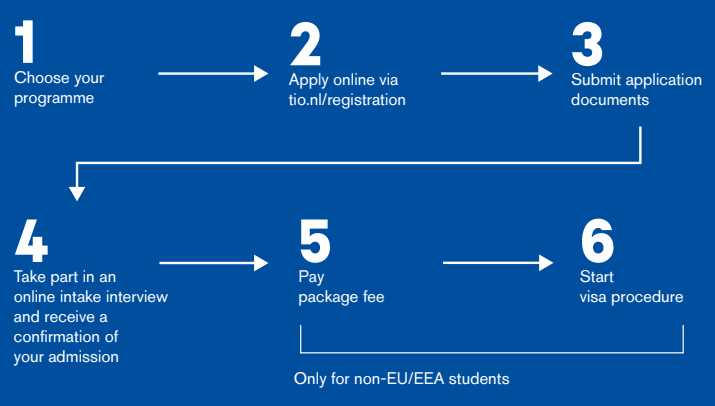Admission
Below, you will find an overview of the admission requirements for the bachelor programme Hotel and Event Management, with which you can determine whether you can start this unique bachelor programme.
Admission requirements
In order to be admitted to this bachelor’s programme, you need 3 documents:
- You need a high school diploma that is equivalent to a Dutch pre-university high school diploma.
- In addition, you need an English test, which proves your English proficiency is at (or exceeds) the level of CEFR: ≥ B2. Tio accepts one of the following three qualifications as proof of English proficiency: TOEFL: iBT ≥ 80 points (taken at an official examination centre), IELTS academic: ≥ 6.0 overall, or Cambridge exam: ≥ 160 points or a Cambridge First Certificate.
In the following cases, students are exempted from the test requirement: students with an IB diploma, American High School Diploma (if accredited in the US, please check with your school board), GCSE certificate for English First Language or English as a second language, or students from the following countries: United States, Canada, United Kingdom, Ireland, Australia, New Zealand, Malta, Singapore. - Valid passport (non-EU/EEA) or IC (EU).
Once you are able to provide the above 3 documents and after approval of Tio, you are all set!
Comparable international diplomas
Below you will find an overview per continent / per country what the admission requirements are for this Bachelor's programme.
Admission process and enrolment dates
This programme starts in August and January. Our degree programmes are generally in high demand. So if you are sure about your choice, go ahead and register at one of our online open days or on the website.

After your registration, we will ask you for some additional information. For example, a copy of your ID and information about your prior education, such as a copy of your degree and a list of transcripts or marks. You still haven’t obtained your diploma? Then make sure to send in your list of marks and diploma as soon as you have received it. Places are allocated in order of registration.
Admission procedure
Once you have registered, we will review your information as quickly as possible to see whether you meet the admission requirements and if there is a waiting list for the study programme of your choosing. A general secondary (havo), preuniversity (vwo) or vocational (mbo4) diploma qualifies you for admission to all bachelor and Associate degree programmes at Tio. If your previous education is not sufficiently aligned to the programme you have chosen, we will contact you to discuss your options. It is also be possible to enrol in a programme at Tio if your prior education was in another country.
Registration period
Your registration is valid for the entire duration of the programme. Each of our bachelor programmes is offered as a three- or four-year programme. Once you complete the first year, and based on your study progress in that first year, you will advance into the second year of either the three-year or four-year track. If you start classes on 1 January, you will have an extra six months to finish the programme (at no additional charge).
- The three-year bachelor track runs from 1 January 2024 or 1 August 2024 to 31 August 2027.
- The four-year bachelor track runs from 1 January 2024 or 1 August 2024 to 31 August 2028.
- The two-year Associate degree runs from 1 January 2024 or 1 August 2024 to 31 August 2026.
Kick-off academic year
Prior to the academic year, the kick-off day and welcome days take place. Tio kicks the year off with an inspiring kick-off day. Students of all Tio campuses attend guest lectures by leading figures from the industry.
The welcome days are devoted to meeting fellow students, the student city and student society Cognatio. You take a look behind the scenes at companies in the industry and above all have a lot of fun. The welcome days take place in the week before the first week of classes.